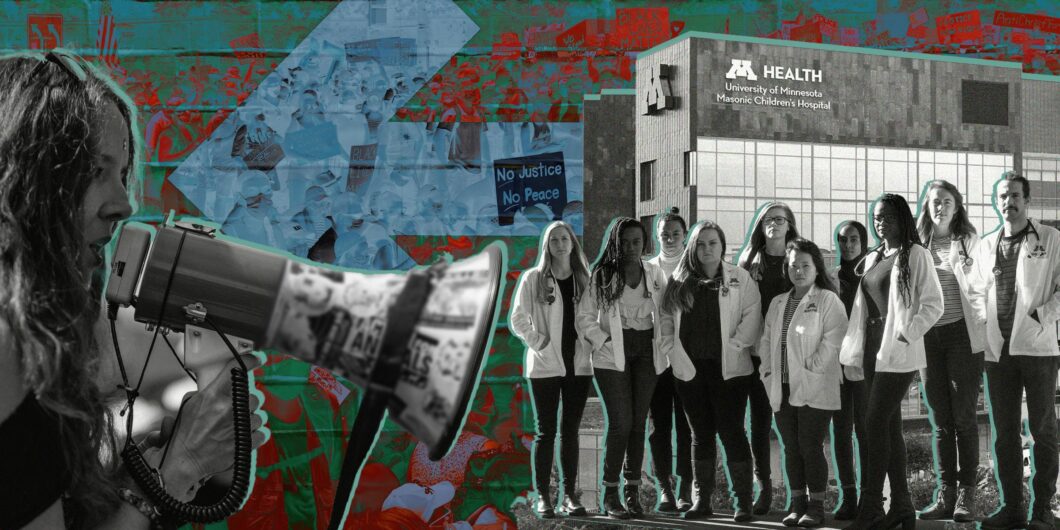By what standards do we distinguish real growth from regression, real freedom from veiled enslavement?
Ideology and the Ultimate Evil
The first essay in this forum argued that the quality of intellectual discourse in American medical schools, and more generally American professional education, is often so poor that it invites the hegemony of poorly examined ideologies. Three physicians, Ronald Dworkin, James Lynch, and Theodore Dalrymple responded, arguing that many ideologists are more interested in power than in truth, that professional education does too little to stir the moral imaginations of students, and that efforts to prepare professional students for citizenship may incline them to tyranny. My reply begins with evil.
In Plato’s Phaedo, Socrates identifies what he regards as the greatest harm a human being can suffer. It is not to lose one’s fortune, to fall from the public stage, to lose one’s grip on power, to fall ill, to be imprisoned, or even to lose one’s life. No, for Socrates the greatest evil that can befall a human being is to become a misologist. Just as misanthropes despise other human beings, so misologists hate reasonable discourse, or more to the point, good conversation. In denying the worth of discourse, they implicitly assail the core texts of the Western philosophical tradition, Plato’s dialogues.
Here lies one of the most important deficits in contemporary professional education and practice. Too many professors, lawyers, clergy, and physicians, among other professionals, carry out their daily work in an environment devoid of good conversation. Professors may be too busy ensuring that they meet accreditation requirements; lawyers may be too busy tracking their billable hours; clergy may be too busy trying to fill pews; and physicians may be too busy ensuring that they are meeting coding and billing requirements. They are all so swept up in busyness that they cannot focus on their proper concern.
But beneath this preoccupation lurks a deeper and even more sinister problem. Many thought they were entering their professions to enlighten minds, promote justice, foster salvation, and save lives, yet they discover over time that they are engaged in a very different sort of enterprise. Their teachers, those they had trusted to show them the way, sometimes turn out to be lost themselves. Still mouthing professional platitudes but having lost all conviction and ceased to grasp what the words really mean, they bequeath their charges little more than cynicism.
The counterpart of such misanthropy, misology, results when, as Socrates puts it,
A man who has dealt with such arguments as appear at one time true, at another time false, should not blame himself or his own lack of ability but, because of his distress, wind up shifting the blame away from himself to the arguments themselves, spending the remainder of his life hating reasonable conversation and so being deprived of truth, knowledge of the way things really are.
The remedy for false views is not ad hominem condemnations, branding those with whom we disagree as unlearned, dense, or diabolical. There is undeniable comfort in adopting the prejudice that we, because of our superior education, vast intelligence, and untarnished characters are somehow innately superior, but this, of course, is just another form of ad hominem. What Socrates calls for is not smug self-assurance but sincere engagement in dialogue, including above all good conversation with those with whom we disagree. To reach deeper truths, we must converse our way through to them.
Misologists, in brief, believe in no truth, or rather believe there is no such thing as truth. They operate with the conviction that conversation can get us nowhere. Instead of engaging in a sincere exploration of ideas, they prefer such techniques as deception, intimidation, and coercion. In the world of ideas as in the world of politics, they presume, the strong and clever do what they will and the weak and dull suffer what they must. To win, it is only necessary to force on others the view that there is no point in trying.
Those who acquiesce in the face of misology have one thing in common—silence. By not saying anything, an activity they have become convinced is of no use, they help create a climate in which good arguments and good conversations are rarely if ever encountered. Ideas degenerate into mere ideologies and interlocutors dissolve into little more than idiots, incapable of contributing. They are not necessarily mute, but in speaking they betray the view that all utterances with even a hint of ethical or political heft are nothing more than expressions of opinion, much like a favorite flavor of ice cream.
Only a thorough-going solipsist could argue that it is enough to know the truth. Those who know the truth, insofar as they acknowledge other knowers, naturally feel some deep measure of responsibility to help others correct their misapprehensions and in so doing move a bit closer themselves to the way things really are. Why did Socrates spend so much time in the marketplace, engaging his fellow Athenians and others in the examination of their own views? Because in so doing, he was practicing generosity in its highest form, and by promoting mutual understanding, also enriching himself.
Ultimately, our lives are less structured by material and molecular forces than by words, and only if we get the words right do we stand a chance of living rightly.
The gravest symptom in contemporary professional education is not silence but one of its opposites—the din of ideology. Views are put forward as dogma and never challenged. Students are told sometimes preposterous and even self-contradictory things with such self-assurance that they are made to feel that even questioning them would permanently tar them as dogmatists. To even pose a question is portrayed as an act of rank betrayal. As Dworkin suggests, education languishes, questions go unasked, and speech ends up compelled—people mouthing words they do not believe or even understand.
When it comes to such murky cultures, the best disinfectant is light—not the light of hypothesis-driven quantitative investigations, biostatistical techniques, or even multi-institutional meta-analyses, but the light of good conversation. The realm of the measurable is much smaller than the universe of what can be known, and those who care about truths that matter most must have the courage to eschew strict reliance on quantification in favor of the kind of knowledge that can make or break the character of a person or community.
The opposite of a misologist is a philosopher, someone who loves wisdom and its pursuit. Education needs philosophers. Law needs philosophers. The clergy needs philosophers. Medicine needs philosophers. All professions need philosophers, people who care less about money, fame, or power than they do about the truth. More than anyone else, they answer the call to citizenship in their professions, because they want to ensure that they steer according to the real stars and thereby best serve the needs of those for whom they exist. As Lynch indicates, through encounters with patients, good medical educators stir the moral imaginations of learners.
The philosopher has no use for ideologies, whether progressive or conservative, libertarian or totalitarian, relativist or absolutist—no use for them, that is, except insofar as they serve as useful points of departure for real conversation. As Socrates so brilliantly illustrates with each of his conversation partners, we must begin every journey not at some ideal point but where we are. Contra Dalrymple, a Virchow represents not an idealized physician-king, someone calling for the replacement of politics with medicine, but a citizen-professional who took seriously his responsibilities to his neighbors and society.
Where do we begin? By engaging learners in conversation, in the classroom, the courtroom, the house of worship, or the clinic. We invite them to lunch, or for coffee, or to join a discussion or reading group. We seek not to indoctrinate but to interrogate—to interrogate ourselves as well as them. We seek to supplant unexamined opinions with arguments and weak arguments with stronger ones. We resist as best we can the impulse to revile and ridicule, choosing instead to take even the most ill-founded view sufficiently seriously that its flaws have a chance to emerge into the light of day.
Should we regard ourselves as guilty for supplanting those who came before us? Should we recognize that attempts to categorize human beings often traumatize them? Should we combat bigotry through bigotry against bigots? Should we listen to others with whom we disagree? Should we seek out those who have been marginalized? These are genuinely fruitful questions—fruitful in the sense that, approached in a truly philosophical spirit, they can move us along a path toward deeper understanding. It is when we find ourselves at our most self-righteous that we most nearly approach tyranny.
The ideological life, the epitome of the unexamined life, is not worth living. In fact, it is a deeply sterile form of existence, insofar as it forsakes one of humanity’s most essential attributes, the capacity to find the fitting words for things, as Adam does in the Genesis creation account. Ultimately, our lives are less structured by material and molecular forces than by words, and only if we get the words right do we stand a chance of living rightly. We must cultivate our innate capacity to speak well with and of one another. Otherwise, we act as little more than misologists, often slipping into misanthropy.


